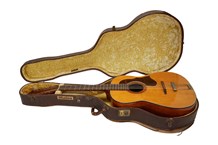However, specific recommendations advising the Government to sign up to the UNIDROIT convention on stolen items, and making it a criminal offence to deal in cultural property which has been illegally exported from another country, could have a significant impact on the trade.
The committee’s full set of recommendations was published in a report submitted to Arts Minister Alan Howarth last week.
Much of the report focuses on museums and the restitution of stolen art to its rightful owners, but the headline recommendations include advice on how the trade should tighten up procedures when checking the provenance of artefacts and what the Government should do to establish a national database of stolen items.
At one point it had been thought that the committee might insist on written provenances for every transaction, a move that would have spelled disaster for much of the trade, particularly for antiquities, where such provenances are rarely available. However, the evidence of expert witnesses from the Antiquities Dealers’ Association, among others, clearly convinced the committee that this was a non-starter. In the summary and conclusions to the report, the first recommendation states: “We have received persuasive evidence that a compulsory ‘log book’ providing such a record would face many difficulties, some of them probably insuperable, and we have concluded reluctantly that such a compulsory ‘log book’ would not represent a practical way forward.” The committee goes on to appeal to trade organisations to establish some sort of voluntary ‘log book’.
As far as a national database of stolen cultural property is concerned, the committee puts the burden of responsibility on the Government and the police, recommending the Home Office seek help and funding from the private sector and that the database should be controlled by the police.
The British Art Market Federation were particularly pleased with this recommendation. BAMF chairman Anthony Browne, who dubbed the report “well balanced” on the whole, welcomed the call for a national database with access to international information on stolen artefacts, something his organisation has been campaigning for. He also felt the involvement of the Home Office directly in dealing with foreign legal authorities would help UK access to overseas data.
What he was not so happy with, however, was the recommendation that the UK sign the 1995 UNIDROIT Convention, with the Government putting it on the fast track to domestic legislation. This, in effect, would remove national boundaries for those seeking the restitution of stolen art, making it easier for the rightful owners of items stolen in the UK and shipped abroad to reclaim them. But it would also expose the trade and institutions in the UK, who may have stolen items from abroad unwittingly in their possession, to similar claims from the rightful owners.
He said that the convention did not work in practice because it did not include a clear definition of cultural property. He also pointed out that with some countries extending their statute of limitations to 75 years, and some having no limit, it effectively meant auctioneers and major dealers having to keep due diligence records permanently on everything they sold to defend themselves against claims.
He added that there was little evidence to show that the convention worked. “One would have expected the market in illict goods to have graduated away from those countries who had signed up to UNIDROIT and towards those who had not. But that has not happened. And if these conventions were the answer to the problems, we would surely see some improvement, but we have not.”
Mr Browne was not so concerned about the recommendation to make it a criminal offence to deal in cultural property which has been illegally exported from another country. He said that the list of qualifications which the committee applied to this recommendation, such as not having retrospective legislation, could make it workable.
Mr Browne is member of the advisory panel of experts appointed by the minister to look into the issues covered by the committee. The panel is due to report its findings in November, and Mr Browne said its members would take a “great deal of notice” of the committee’s conclusions.




